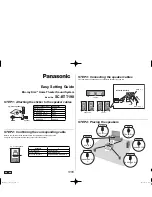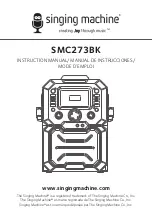
17
Format of safety instructions
DANGER!
Type and source of the danger!
Â
Consequences of non-observance
¾
Danger prevention measure
Safety in the workplace
▸
Do not operate the tool in areas where there is a
risk of explosion.
Â
Electric power tools generate sparks that could
ignite dust or fumes.
▸
Keep the tool out of the reach of children and
never leave it unattended.
▸
Before starting welding, remove all solvents,
thinners, degreasing agents and other flammable
materials from the work site. Cover all stationary
flammable materials.
Welding work may only be performed when the
ambient air does not contain high concentrations
of dust, acid vapours, gases or flammable sub
-
stances. Extra care is required when performing
repair work on pipe systems and containers
which contain or contained flammable liquids or
gases.
▸
The appliance may only be connected to a
properly grounded mains supply. (Three-phase
four-wire system with grounded neutral conductor
or one-phase three-wire system with grounded
neutral conductor).
▸
The protective conductor for the socket and the
extension cable must be in working order.
Electrical safety
▸
The device must not be operated in a wet or
damp environment. Do not expose the device to
rain.
Â
If water penetrates into the electrical device, the
risk of an electric shock is increased.
Self and personnel protection
▸
Persons less than 18 years old must not use the
device. Excepted from this are young persons of
16 and over who are working under supervision
within the scope of their vocational training.
▸
Always remain alert and take the utmost care
when working.
▸
Do not use the tool if you are tired or under the
influence of drugs, alcohol or medicines.
Â
One moment of inattention can result in severe
injuries.
▸
Always wear suitable protective clothing, i.e.
suitable leather gloves and leather apron. Wear
stout shoes and a safety helmet.
Â
Wearing personal protective equipment reduces
the risk of injury.
▸
Never perform welding work without using a
welding shield. Warn all persons in the vicinity
about the electric arc rays.
▸
Use suitable extraction equipment for gases
and cutting vapours. Use breathing equipment if
there is the danger of inhaling welding or cutting
vapours.
▸
If the mains cable is damaged or severed during
work, do not touch the cable and remove the
mains plug immediately.
▸
Never use the appliance when the power cord is
damaged.
General safety instructions
▸
Always visually check the device for damage
before initial use and after transport. Ensure any
damage is repaired by trained service personnel
prior to initial use.
▸
Always have a fire extinguisher within reach.
▸
Perform a fire check after completing welding
work (see German trade association's regula-
tions).
▸
Never try to dismantle the pressure reducer.
Replace the pressure reducer if it is defective.
▸
Ensure good and direct contact of the workpiece
line in the immediate vicinity to the welding spot.
▸
Never direct the welding current through chains,
ball bearings, steel cables, protective conductors
etc. as they may melt.
▸
Secure yourself and the device when working on
high or inclined working surfaces.
▸
Never use the welding machine to thaw frozen
pipes or lines.
▸
For work in closed containers or in confined
spaces or when there is an increased electrical
hazard, only devices with the
S
sign may be
used.
▸
During breaks the appliance should be switched
off and the valve of the gas cylinder should be
closed.
Safety Instructions
















































